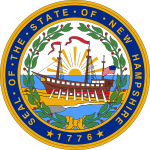
Robert Clinton Smith is an American politician who served as a member of the United States House of Representatives for New Hampshire's 1st congressional district from 1985 to 1990 and the state of New Hampshire in the United States Senate from 1990 to 2003.
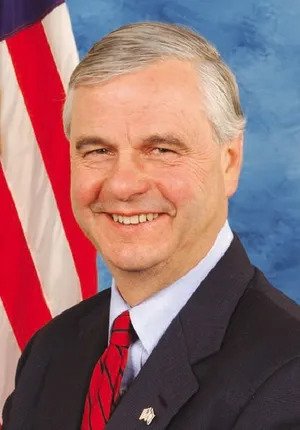
Joseph Edmund "Jeb" Bradley III is an American politician and member of the Republican Party who serves in the New Hampshire Senate. He represents his hometown of Wolfeboro, New Hampshire and 16 other towns in east-central New Hampshire for District 3. He was a member of the New Hampshire House of Representatives from 1990 to 2000, and then served as the U.S. representative for New Hampshire's 1st congressional district from 2003 to 2007. He was Majority Leader of the New Hampshire Senate from 2010 to 2018 and again from 2020 to 2022.

The 1996 United States Senate elections were held on November 5, with the 33 seats of Class 2 contested in regular elections. Special elections were also held to fill vacancies. They coincided with the presidential election of the same year, in which Democrat Bill Clinton was re-elected president.
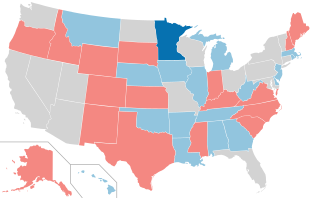
The 1990 United States Senate elections were held on Tuesday, November 6, 1990, with the 33 seats of Class 2 contested in regular elections. Special elections were also held to fill vacancies. The Democratic Party increased its majority with a net gain of one seat from the Republican Party. The election cycle took place in the middle of President George H. W. Bush's term, and, as with most other midterm elections, the party not holding the presidency gained seats in Congress. Until 2022, this had been the only election cycle where only one U.S. Senate seat flipped parties.

The 1986 United States Senate elections were elections for the United States Senate. Held on November 4, in the middle of Ronald Reagan's second presidential term, the 34 seats of Class 3 were contested in regular elections. The Republicans had to defend an unusually large number of freshman Senate incumbents who had been elected on President Ronald Reagan's coattails in 1980. Democrats won a net of eight seats, defeating seven freshman incumbents, picking up two Republican-held open seats, and regaining control of the Senate for the first time since January 1981. This remains the most recent midterm election cycle in which the sitting president's party suffered net losses while still flipping a Senate seat.

The 1980 United States Senate elections were held on November 4, coinciding with Ronald Reagan's victory in the presidential election. The 34 Senate seats of Class 3 were contested in regular elections. Reagan's large margin of victory over incumbent Jimmy Carter gave a huge boost to Republican Senate candidates, allowing them to flip 12 Democratic seats and win control of the chamber for the first time since the end of the 83rd Congress in January 1955.

The 1974 United States Senate elections were held on November 5, with the 34 seats of Class 3 contested in regular elections. They occurred in the wake of the Watergate scandal, Richard M. Nixon's resignation from the presidency, and Gerald Ford's subsequent pardon of Nixon. Economic issues, specifically inflation and stagnation, were also a factor that contributed to Republican losses. As an immediate result of the November 1974 elections, Democrats made a net gain of three seats from the Republicans, as they defeated Republican incumbents in Colorado and Kentucky and picked up open seats in Florida and Vermont, while Republicans won the open seat in Nevada. Following the elections, at the beginning of the 94th U.S. Congress, the Democratic caucus controlled 60 seats, and the Republican caucus controlled 38 seats.

The 1958 United States Senate elections were elections for the United States Senate which occurred in the middle of President Dwight D. Eisenhower's second term. Thirty-two seats of Class 1 were contested in regular elections, the new state of Alaska held its first Senate elections for its Class 2 and 3 seats, and two special elections were held to fill vacancies.

John Anthony Durkin was an American politician who served as a Democratic U.S. Senator from New Hampshire from 1975 until 1980.

The United States Senate election in New Hampshire was held on November 4, 2008. Incumbent Republican U.S. Senator John E. Sununu ran for re-election to a second term, but was defeated by Democrat Jeanne Shaheen in a rematch of the 2002 election. Shaheen's win marked the first time since 1972 that Democrats won this seat, and made her the first Democratic Senator elected from New Hampshire since John A. Durkin's victory in 1975.
The 1974–75 elections for United States Senator in New Hampshire, first held November 5, 1974 and held again September 16, 1975, were part of the longest contested election for the Congress in United States history.

The 1996 United States Senate election in New Hampshire was held on November 5, 1996. Incumbent Republican U.S. Senator Bob Smith won re-election to a second term. Smith had established himself as the most conservative Senator from the Northeast, and Bill Clinton's coattails nearly caused his defeat. That was to the point that on the night of the election many American media networks incorrectly projected that Dick Swett had won.

The 2014 United States Senate election in New Hampshire was held on November 4, 2014, to elect a member of the United States Senate to represent the state of New Hampshire, concurrently with the election of the governor of New Hampshire, as well as other elections to the United States Senate in other states and elections to the United States House of Representatives and various state and local elections.

The 2016 United States Senate election in New Hampshire was held November 8, 2016, to elect a member of the United States Senate to represent the State of New Hampshire, concurrently with the 2016 U.S. presidential election, as well as other elections to the United States Senate in other states and elections to the United States House of Representatives and various state and local elections. The primary election to select the candidates who appeared on the general election ballot took place on September 13, 2016.

The 1942 United States Senate election in New Hampshire took place on November 3, 1942. Incumbent Republican Senator Styles Bridges won re-election to a second term in office, defeating Democratic former Governor Francis P. Murphy.

The 2020 United States Senate election in New Hampshire was held on November 3, 2020, to elect a member of the United States Senate to represent the State of New Hampshire, concurrently with the 2020 U.S. presidential election, as well as other elections to the United States Senate, elections to the United States House of Representatives and various state and local elections. Incumbent Democratic Senator Jeanne Shaheen won reelection to a third term after comfortably defeating Republican nominee Bryant Messner by 15.6 points and sweeping every single county in the state. This marked the first Senate election since 1972 in which the Democrat carried Belknap County.

The 1960 United States Senate election in New Hampshire took place on November 8, 1960. Incumbent Republican Senator Styles Bridges won re-election to a fifth term in office, defeating Democrat Herbert Hill. Bridges died on November 26, 1961, less than one year after his term began.

The 1978 United States Senate election in New Hampshire took place on November 7, 1978. Incumbent Democratic Senator Thomas J. McIntyre ran for re-election to a fourth term but was defeated by Republican Gordon J. Humphrey.
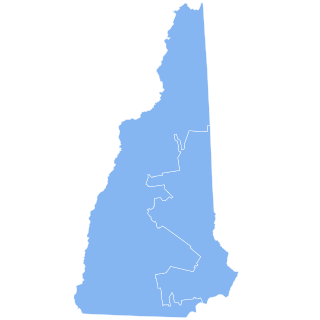
The 2020 United States House of Representatives elections in New Hampshire were held on November 3, 2020, to elect the two U.S. representatives from the state of New Hampshire, one from each of the state's two congressional districts. The elections coincided with the 2020 U.S. presidential election, as well as other elections to the House of Representatives, elections to the United States Senate and various state and local elections.
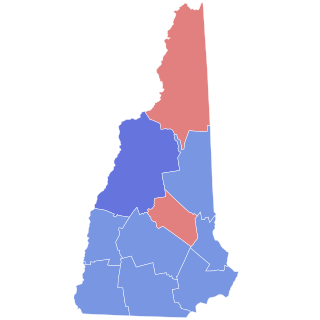
The 2022 United States Senate election in New Hampshire was held on November 8, 2022, to elect a member of the United States Senate to represent the State of New Hampshire. The primary elections were held on September 13, 2022. Incumbent Senator Maggie Hassan was re-elected over Republican retired brigadier general Don Bolduc by an unexpectedly large margin of 9.1% that surpassed most polls. Hassan won her initial bid for this seat in 2016 by only 1,017 votes or 0.14%. This election marked the first time a Democrat won re-election to New Hampshire's class 3 Senate seat.
